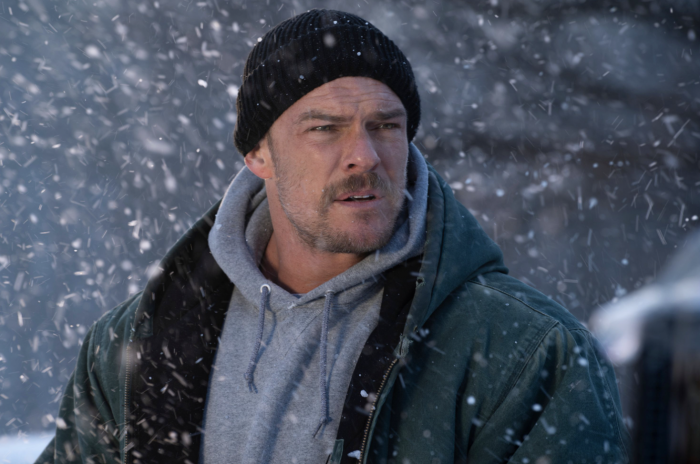'Ordinary Angels' review: Hilary Swank film magnifies biblical truths without preachiness

Jon and Andy Erwin, the producers behind "Ordinary Angels," wanted the Lionsgate/Kingdom Story film to serve as a follow-up to their 2023 hit film "Jesus Revolution," a tangible example of what Christian service should look like after spiritual transformation.
And without being too heavy-handed or overly preachy, "Ordinary Angels," starring Hilary Swank and Alan Ritchson, does exactly that.
Based on a true story, "Ordinary Angels" opens in 1990s Louisville, Kentucky, where Ed Schmitt (Ritchson) is saying goodbye to his wife, Theresa, who is dying due to a rare liver disease. It's the same disease the younger of their two daughters, Michelle, has, and the only cure is a liver transplant. Unfortunately, the medical bills are overwhelming, and Ed, a roofer, can't keep up.
Viewers are then introduced to Sharon Stevens (Swank), a hairdresser battling alcoholism who has a fractured relationship with her son. She encounters the Schmitt family's ordeal in the local newspaper at an Alcoholics Anonymous meeting. She quickly discovers her new purpose: aiding the Schmitt family in getting Michelle the life-saving treatment she needs.
Michelle's plight becomes the catalyst for Sharon's journey toward purpose and self-discovery. Her initial gesture of organizing a fundraiser at her hair salon is just the beginning of her relentless efforts to support the family despite Ed's resistance (he doesn't understand why Sharon would meddle in the lives of people she barely knows).
Taking on roles far beyond those of a hairdresser, she becomes an indispensable source of hope and assistance to the Schmitts, raising significant funds, advocating for their cause and managing their finances, though sometimes her tactics aren't the most scrupulous.
In one scene, she tells Ed that some bills are worth ignoring. They're "like wine," she says. "They get better with age."
Yet, this journey is not without its challenges. Sharon's compulsion to help mirrors her struggles with addiction — a fact she's soon confronted with — and avoidance of her own fragile familial relationships, suggesting a complex path toward redemption and healing.
Ed, meanwhile, embodies the tireless love and dedication of a father facing the worst fears imaginable. He works tirelessly to provide for his daughters and to maintain a semblance of normalcy in their lives despite experiencing his own grief. It's his crisis of faith — how can a good God allow such terrible things to happen — and the local church's efforts to support the Schmitts that highlight the profound questions of suffering and divine presence in times of hardship.
"My faith? You know how many prayer lists Theresa was on?" he says in one scene. "Seventeen. And now, they got Michelle on those same lists. Lots of good faith's doing me."
Though a family-friendly movie, "Ordinary Angels" does explore serious themes like addiction, grief, illness and despair. Sharon is shown drunk on several occasions, and in one particularly heartbreaking scene, Michelle vomits blood. Filmmakers don't shy away from portraying people realistically — messy, broken and in need of redemption.
Yet, the film ultimately celebrates the extraordinary impact of compassion and action, highlighting the reality that anyone — even those battling their own demons — can make a difference in the lives of others. Sharon's journey from self-destruction to self-improvement, paralleled by her unwavering commitment to the Schmitt family, offers a message of hope amid brokenness and the transformative power of kindness.
Also central to the film's message is the theme of communal support, showcased in Sharon's initiative to host a fundraiser, which bridges the gap between her and Ed's family and rallies the broader community in a collective effort to uplift one of their own.
Ultimately, the helicopter equipped to bring Michelle to her life-saving treatment in the middle of a blizzard lands at the local church, thanks to the efforts of congregants who brave freezing weather to dig out a landing strip.
Directed by Jon Gunn ("Case for Christ"), "Ordinary Angels" invites audiences to find beauty in imperfection and strength in adversity without feeling overly preachy, a rare feat in the world of historically neatly packaged faith-based films.
The goal of "Ordinary Angel," filmmakers told The Christian Post, is to encourage those who profess Christ to turn their faith into action, as "faith without works is dead." They said that even the most unlikely heroes can be an "ordinary angel" in their community. It's a powerful and timely message, yet one rarely made in film and media.
"What makes a cheesy Christian film is the fact that, as Christians, sometimes we're scared to embrace struggle and tension, and all those things of being flawed individuals, to get to that place of hope or that place of redemption," Andy Erwin said.
"What we try to do with all of our movies is embrace the struggle. In this case, Sharon is a hot mess of a person, but she's also an 'ordinary angel' in Ed's life who finds her purpose in saving a little girl. I think it gives hope to the ordinary, everyday person that is flawed and struggling their way through life to find their calling and their purpose."
"Ordinary Angels" is now playing in theaters.
Leah M. Klett is a reporter for The Christian Post. She can be reached at: leah.klett@christianpost.com




























